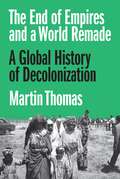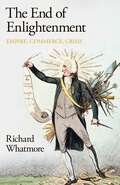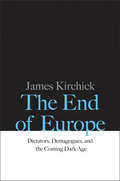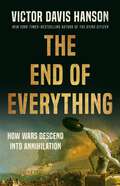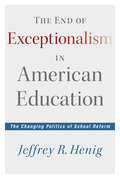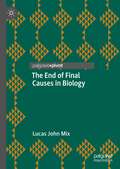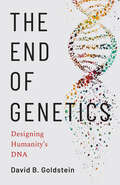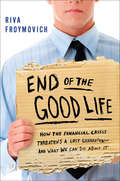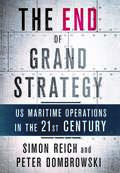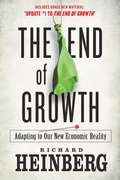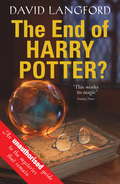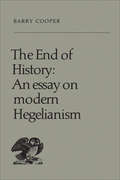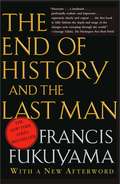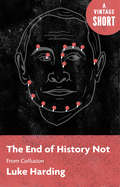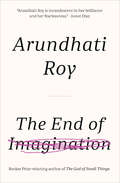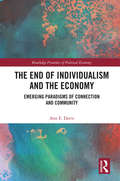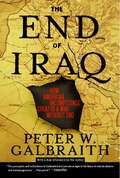- Table View
- List View
The End of Empires and a World Remade: A Global History of Decolonization
by Professor Martin ThomasA capacious history of decolonization, from the decline of empires to the era of globalizationEmpires, until recently, were everywhere. They shaped borders, stirred conflicts, and set the terms of international politics. With the collapse of empire came a fundamental reorganization of our world. Decolonization unfolded across territories as well as within them. Its struggles became internationalized and transnational, as much global campaigns of moral disarmament against colonial injustice as local contests of arms. In this expansive history, Martin Thomas tells the story of decolonization and its intrinsic link to globalization. He traces the connections between these two transformative processes: the end of formal empire and the acceleration of global integration, market reorganization, cultural exchange, and migration.The End of Empires and a World Remade shows how profoundly decolonization shaped the process of globalization in the wake of empire collapse. In the second half of the twentieth century, decolonization catalyzed new international coalitions; it triggered partitions and wars; and it reshaped North-South dynamics. Globalization promised the decolonized greater access to essential resources, to wider networks of influence, and to worldwide audiences, but its neoliberal variant has reinforced economic inequalities and imperial forms of political and cultural influences. In surveying these two codependent histories across the world, from Latin America to Asia, Thomas explains why the deck was so heavily stacked against newly independent nations.Decolonization stands alongside the great world wars as the most transformative event of twentieth-century history. In The End of Empires and a World Remade, Thomas offers a masterful analysis of the greatest process of state-making (and empire-unmaking) in modern history.
The End of Enlightenment: Empire, Commerce, Crisis
by Richard Whatmore'A brilliant and revelatory book about the history of ideas' David Runciman 'Fascinating and important' Ruth Scurr The Enlightenment is popularly seen as the Age of Reason, a key moment in human history when ideals such as freedom, progress, natural rights and constitutional government prevailed. In this radical re-evaluation, historian Richard Whatmore shows why, for many at its centre, the Enlightenment was a profound failure.By the early eighteenth century, hope was widespread that Enlightenment could be coupled with toleration, the progress of commerce and the end of the fanatic wars of religion that were destroying Europe. At its heart was the battle to establish and maintain liberty in free states – and the hope that absolute monarchies such as France and free states like Britain might even subsist together, equally respectful of civil liberties. Yet all of this collapsed when states pursued wealth and empire by means of war. Xenophobia was rife and liberty itself turned fanatic.The End of Enlightenment traces the changing perspectives of economists, philosophers, politicians and polemicists around the world, including figures as diverse as David Hume, Adam Smith, Edmund Burke and Mary Wollstonecraft. They had strived to replace superstition with reason, but witnessed instead terror and revolution, corruption, gross commercial excess and the continued growth of violent colonialism.Returning us to these tumultuous events and ideas, and digging deep into the thought of the men and women who defined their age, Whatmore offers a lucid exploration of disillusion and intellectual transformation, a brilliant meditation on our continued assumptions about the past, and a glimpse of the different ways our world might be structured - especially as the problems addressed at the end of Enlightenment are still with us today.
The End of Europe: Dictators, Demagogues, and the Coming Dark Age
by James KirchickOnce the world's bastion of liberal, democratic values, Europe is now having to confront demons it thought it had laid to rest. The old pathologies of anti-Semitism, populist nationalism, and territorial aggression are threatening to tear the European postwar consensus apart. In riveting dispatches from this unfolding tragedy, James Kirchick shows us the shallow disingenuousness of the leaders who pushed for "Brexit;" examines how a vast migrant wave is exacerbating tensions between Europeans and their Muslim minorities; explores the rising anti-Semitism that causes Jewish schools and synagogues in France and Germany to resemble armed bunkers; and describes how Russian imperial ambitions are destabilizing nations from Estonia to Ukraine. With President Trump now threatening to abandon America's traditional role as upholder of the liberal world order and guarantor of the continent's security, Europe may be alone in dealing with these unprecedented challenges. Based on extensive firsthand reporting, this book is a provocative, disturbing look at a continent in unexpected crisis.
The End of Everything
by David Bergelson Joseph ShermanOriginally published in 1913, and titled When All Is Said and Done in previous translations, The End of Everything is one of the great novels of the twentieth century. Considered David Bergelson’s masterpiece, it was written in Yiddish and until now has been unavailable in a complete and accurate English translation. This version by acclaimed translator Joseph Sherman finally brings the novel to a wide English-speaking audience.Bergelson depicts the lives of upwardly mobile, self-aware nouveaux riche Jews in the waning years of the Russian Empire. The central character, Mirel Hurvits, is an educated, beautiful woman who embodies the conflict between tradition and progress, aristocracy and enterprise. A forced marriage of convenience results in Mirel’s emotional disintegration and provokes a confrontation with the expectations of her pious family and with Jewish tradition. In a unique prose style of unsurpassable range and beauty, Bergelson reduces language to its bare essentials, punctuated by silences that heighten the sense of alienation in the story.
The End of Everything: How Wars Descend into Annihilation
by Victor Davis HansonIn this &“gripping account of catastrophic defeat&” (Barry Strauss), a New York Times–bestselling historian charts how and why some societies chose to utterly destroy their foes, and warns that similar wars of obliteration are possible in our time &“In The End of Everything, Hanson tells compelling and harrowing stories of how civilizations perished. He helps us consider contemporary affairs in light of that history, think about the unthinkable, and recognize the urgency of trying to prevent our own demise.&” — H. R. McMaster, author of Battlegrounds War can settle disputes, topple tyrants, and bend the trajectory of civilization—sometimes to the breaking point. From Troy to Hiroshima, moments when war has ended in utter annihilation have reverberated through the centuries, signaling the end of political systems, cultures, and epochs. Though much has changed over the millennia, human nature remains the same. Modern societies are not immune from the horror of a war of extinction. In The End of Everything, military historian Victor Davis Hanson narrates a series of sieges and sackings that span the age of antiquity to the conquest of the New World to show how societies descend into barbarism and obliteration. In the stories of Thebes, Carthage, Constantinople, and Tenochtitlan, he depicts war&’s drama, violence, and folly. Highlighting the naivete that plagued the vanquished and the wrath that justified mass slaughter, Hanson delivers a sobering call to contemporary readers to heed the lessons of obliteration lest we blunder into catastrophe once again.
The End of Exceptionalism in American Education: The Changing Politics of School Reform
by Jeffrey R. HenigOver the past fifty years, the "special status" of education decision-making has been eroded. Once the province of local and state school boards, decisions about schools and schooling have begun to emerge in every level and branch of government. In The End of Exceptionalism in American Education, Jeffrey R. Henig traces the roots of this tectonic shift in school governance. Carefully reasoned, astutely observed, and thoughtfully presented, this volume promises to become a classic work in our understanding of education policy--and an invaluable resource for those seeking to influence its future trajectory.
The End of Exceptionalism in American Education: The Changing Politics of School Reform
by Jeffrey R. HenigOver the past fifty years, the &“special status&” of education decision-making has been eroded. Once the province of local and state school boards, decisions about schools and schooling have begun to emerge in every level and branch of government. In The End of Exceptionalism in American Education, Jeffrey R. Henig traces the roots of this tectonic shift in school governance. Carefully reasoned, astutely observed, and thoughtfully presented, this volume promises to become a classic work in our understanding of education policy—and an invaluable resource for those seeking to influence its future trajectory.
The End of Final Causes in Biology
by Lucas John MixThis book provides a straightforward introduction to teleology in biology, the work it did and the work it can do. Informed by history and philosophy, it focuses on scientific concerns. Seventeenth, eighteenth, and nineteenth century biologists proposed a menagerie of biological “actors” to explain power without appealing to Aristotelian vegetable souls and final causes. Three constraints on teleology narrowed the field, selecting among the various actors as they mutated and recombined. Methodological naturalism, local adaptation, and blind chance each represent a significant philosophical advance in biology. Kant, Darwin, and the Modern Synthesis provided a new teleology, grounded in natural selection, an etiological recursion of form and function, and the details of carbon chemistry on Earth. They naturalized teleology, but they also finalized nature, shifting conceptions about the world and science. Understanding these links – historical, philosophical, and theoretical – sets the stage for new work moving forward.
The End of Genetics: Designing Humanity's DNA
by David B. GoldsteinAn urgent plea for a broader understanding and awareness of the unconsidered dangers of new genetic technologies Since 2010 it has been possible to determine a person&’s genetic makeup in a matter of days at an accessible cost for many millions of people. Along with this technological breakthrough there has emerged a movement to use this information to help prospective parents &“eliminate preventable genetic disease.&” As the prospect of systematically excluding the appearance of unwanted mutations in our children comes within reach, David B. Goldstein examines the possible consequences from these types of choices. Engaging and accessible, this clarion call for responsible and informed stewardship of the human genome provides an overview of what we do and do not know about human genetics and looks at some of the complex, yet largely unexplored, issues we must be most careful about as we move into an era of increasing numbers of parents exercising direct control over the genomes of their children.
The End of Globalization: Lessons from the Great Depression
by Harold James"Globalization" is here. Signified by an increasingly close economic interconnection that has led to profound political and social change around the world, the process seems irreversible. In this book, however, Harold James provides a sobering historical perspective, exploring the circumstances in which the globally integrated world of an earlier era broke down under the pressure of unexpected events. James examines one of the great historical nightmares of the twentieth century: the collapse of globalism in the Great Depression. Analyzing this collapse in terms of three main components of global economics--capital flows, trade, and international migration--James argues that it was not simply a consequence of the strains of World War I but resulted from the interplay of resentments against all these elements of mobility, as well as from the policies and institutions designed to assuage the threats of globalism. Could it happen again? There are significant parallels today: highly integrated systems are inherently vulnerable to collapse, and world financial markets are vulnerable and unstable. While James does not foresee another Great Depression, his book provides a cautionary tale in which institutions meant to save the world from the consequences of globalization--think WTO and IMF, in our own time--ended by destroying both prosperity and peace.
The End of Glory: War & Peace in HMS Hood 1916-1941
by Bruce TaylorThe career of the legendary British battlecruiser is vividly recounted from its commissioning to its tragic end in this naval history. The HMS Hood was the glory of the Royal Navy. In The End of Glory, historian Bruce Taylor combines in-depth research and thrilling narrative to tell its story. For twenty years Hood symbolized the Royal Navy during the twilight years of the British Empire. Yet in 1941, it was destroyed in seconds by the battleship Bismarck, a catastrophe that shattered the morale the British public. Through official documents as well as the personal accounts and reminiscences of more than 150 crewmen, this volume offers a vivid portrait of this naval icon. An insider&’s view of a warship in peace and war, The End of Glory not only paints an intimate picture of everyday life but deals with controversial issues such as the Invergordon mutiny, escapades ashore and afloat, the Christmas mutiny of 1940 and the terrible conditions onboard in war. This coverage, based on so many original sources, makes for a truly compelling story that neither historian, enthusiast nor general reader will find easy to put down.
End of The Good Life
by Riva FroymovichA richly reported examination of the effects of the financial crisis on Generation Y, and a portrait of a generation--and a nation--in crisis.
The End of Grand Strategy: US Maritime Operations in the Twenty-First Century
by Simon Reich Peter DombrowskiIn The End of Grand Strategy, Simon Reich and Peter Dombrowski challenge the common view of grand strategy as unitary. They eschew prescription of any one specific approach, chosen from a spectrum that stretches from global primacy to restraint and isolationism, in favor of describing what America’s military actually does, day to day. They argue that a series of fundamental recent changes in the global system, the inevitable jostling of bureaucratic politics, and the practical limitations of field operations combine to ensure that each presidential administration inevitably resorts to a variety of strategies. Proponents of different American grand strategies have historically focused on the pivotal role of the Navy. In response, Reich and Dombrowski examine six major maritime operations, each of which reflects one major strategy. One size does not fit all, say the authors—the attempt to impose a single overarching blueprint is no longer feasible. Reich and Dombrowski declare that grand strategy, as we know it, is dead. The End of Grand Strategy is essential reading for policymakers, military strategists, and analysts and critics at advocacy groups and think tanks.
The End of Growth: Adapting to Our New Economic Reality
by Richard HeinbergEconomists insist that recovery is at hand, yet unemployment remains high, real estate values continue to sink, and governments stagger under record deficits. The End of Growth proposes a startling diagnosis: humanity has reached a fundamental turning point in its economic history. The expansionary trajectory of industrial civilization is colliding with non-negotiable natural limits. Richard Heinberg's latest landmark work goes to the heart of the ongoing financial crisis, explaining how and why it occurred, and what we must do to avert the worst potential outcomes. Written in an engaging, highly readable style, it shows why growth is being blocked by three factors: Resource depletion Environmental impacts Crushing levels of debt These converging limits will force us to re-evaluate cherished economic theories and to reinvent money and commerce. The End of Growth describes what policy makers, communities, and families can do to build a new economy that operates within Earth's budget of energy and resources. We can thrive during the transition if we set goals that promote human and environmental well-being, rather than continuing to pursue the now-unattainable prize of ever-expanding GDP. Richard Heinberg is the author of nine previous books, including The Party's Over, Peak Everything, and Blackout. A senior fellow of the Post Carbon Institute, Heinberg is one of the world's foremost peak oil educators and an effective communicator of the urgent need to transition away from fossil fuels.
The End of Harry Potter?
by David LangfordTHE END OF HARRY POTTER is the perfect companion volume for all Harry Potter fans. Award-winning writer and Potter fan David Langford delves into the six Harry Potter books to explore J.K. Rowling's universe and characters, and shows in detail how cleverly J.K. Rowling has woven her world.This is the book for you if you are one of the gazillions of readers who find themselves wondering about horcruxes and Deatheaters and Dark Lords ... Langford looks at questions like:*What are the remaining horcruxes, the places He Who Shall Not Be Named has stashed his soul so he can never die?*Does Harry himself bear a part of the Dark Lord's soul in his scar?*Is that why Harry understands Parseltongue - and if not, why does he speak the language of the serpentssss?*What will happen when Harry is technically a grown-up, and no longer under the protection of his Uncle Vernon and Aunt Petunia?*Is Albus Dumbledore really dead?*Whose side is Severus Snape really on?*Will Hogwarts survive the final, apocalyptic battle between Harry and You-Know-Who?Don't know the answers? Then read THE END OF HARRY POTTER!
The End of Harry Potter?
by David LangfordTHE END OF HARRY POTTER is the perfect companion volume for all Harry Potter fans. Award-winning writer and Potter fan David Langford delves into the six Harry Potter books to explore J.K. Rowling's universe and characters, and shows in detail how cleverly J.K. Rowling has woven her world.This is the book for you if you are one of the gazillions of readers who find themselves wondering about horcruxes and Deatheaters and Dark Lords ... Langford looks at questions like:*What are the remaining horcruxes, the places He Who Shall Not Be Named has stashed his soul so he can never die?*Does Harry himself bear a part of the Dark Lord's soul in his scar?*Is that why Harry understands Parseltongue - and if not, why does he speak the language of the serpentssss?*What will happen when Harry is technically a grown-up, and no longer under the protection of his Uncle Vernon and Aunt Petunia?*Is Albus Dumbledore really dead?*Whose side is Severus Snape really on?*Will Hogwarts survive the final, apocalyptic battle between Harry and You-Know-Who?Don't know the answers? Then read THE END OF HARRY POTTER!
The End of History: An Essay on Modern Hegelianism
by Barry CooperHistory ended, according to Hegel according to Kojève, with the establishment and proliferation in Europe of states organized along Napoleonic lines: rational, bureaucratic, homogenous, atheist. This state lives in some tension with the popular slogan that helped give it birth: Liberty, Equality, Fraternity. But there is now also totalitarianism – the only new kind of regime, according to Arendt, created since the national state. Man is now in charge of nature, technology, and society; much of political life has become a gavotte elaborating the meaning of the Napoleonic model.This interpretation, however opposed it seems to common sense, has been influential, particularly in France where the course of existentialism is unintelligible without taking it into account. Professor Cooper argues that it is inherently plausible and examines the arguments of Hegel and Kojève to reveal its consistency and explanatory power. And he applies it to more contemporary events – the experience of the atomic bomb, the Gulag system of extermination, and the growth of multinational corporations.The work concludes by pulling together the presuppositions and theories of the totalitarian system, the Hegelian version of the Napoleonic state, and our contemporary technological society. Overall, the reader will find here a complete and challenging presentation of how the modern world understands its collective life.
The End of History and the Last Man
by Francis FukuyamaEver since its first publication in 1992, The End of History and the Last Manhas provoked controversy and debate. Francis Fukuyama's prescient analysis of religious fundamentalism, politics, scientific progress, ethical codes, and war is as essential for a world fighting fundamentalist terrorists as it was for the end of the Cold War. Now updated with a new afterword, The End of History and the Last Man is a modern classic.
The End of History Not: from Collusion (A Vintage Short)
by Luke HardingIn December 2016, the Guardian reporter and former Moscow bureau chief Luke Harding, quietly met Christopher Steele, who’s infamous dossier sparked one of the most sensational scandals to rock modern political and the biggest threats to the Trump campaign and presidency. In the explosive first pages of the #1 New York Times bestseller Collusion, Harding chronicles Steele’s incredible background as an MI6 officer on the Moscow desk and the secret sources behind one the most incendiary and devastating reports in American and Russian political history. A Vintage Shorts Selection. An ebook short.
The End of Iberian Rule on the American Continent, 1770–1830
by Hamnett Brian R.In this new work, Brian R. Hamnett offers a comprehensive assessment of the independence era in both Spanish America and Brazil by examining the interplay between events in Iberia and in the overseas empires of Spain and Portugal. Most colonists had wanted some form of unity within the Spanish and Portuguese monarchies but European intransigence continually frustrated this aim. Hamnett argues that independence finally came as a result of widespread internal conflict in the two American empires, rather than as a result of a clear separatist ideology or a growing national sentiment. With the collapse of empire, each component territory faced a struggle to survive. The End of Iberian Rule on the American Continent, 1770–1830 is the first book of its kind to give equal consideration to the Spanish and Portuguese dimensions of South America, examining these territories in terms of their divergent component elements.
The End of Ideology: On the Exhaustion of Political Ideas in the Fifties
by Daniel BellThese essay, in the main, deal with the social changes in the America of the fifties. It was a decade marked by extraordinary changes in the class structure, particularly in the growth of the white-collar class and the spread of suburbia; by the "forced" expansion of the economy, which belied earlier predictions of stagnation; by the creation of a permanent military establishment and a bedrock defense economy; and by the heightening tensions of the Cold War. In consequence, we have had the problem, abroad, of defining ourselves to Indians, Africans, Arabs, et al., and, at home, a preoccupation with "self" and "status" that has brought to the fore not only psychoanalysis but the mirror of popular sociology. The "restless vanity" of which de Tocqueville spoke, which made the American, in his intercourse with strangers, "impatient of the slightest censure and insatiable of praise," has been replaced by an anxious inferiority, fearful of censure and desperately eager to please.
The End of Imagination: And Other Essays
by Arundhati RoyThe End of Imagination brings together five of Arundhati Roy's acclaimed books of essays into one comprehensive volume for the first time and features a new introduction by the author.This new collection begins with her pathbreaking book The Cost of Living-published soon after she won the Booker Prize for her novel The God of Small Things-in which she forcefully condemned India's nuclear tests and its construction of enormous dam projects that continue to displace countless people from their homes and communities. The End of Imagination also includes her nonfiction works Power Politics, War Talk, Public Power in the Age of Empire, and An Ordinary Person's Guide to Empire, which include her widely circulated and inspiring writings on the U.S. invasions of Afghanistan and Iraq, the need to confront corporate power, and the hollowing out of democratic institutions globally.
The End of Individualism and the Economy: Emerging Paradigms of Connection and Community (Routledge Frontiers of Political Economy)
by Ann E. DavisIndividualism has been one of the driving forces in the rise of modern capitalism, and methodological individualism has been dominant in social science for many years. In this paradigm the economy is seen as a machine to routinize production and improve efficiency, and the discipline of economics has come to focus on control and automation. Recent innovations in natural and social sciences, however, indicate a shift in thinking away from individualism and towards interconnectedness. The End of Individualism and the Economy: Emerging Paradigms of Connection and Community traces the origins of “the individual” in history, philosophy, economics, and social science. Drawing from linguistic philosophy, there is increasing attention to language as a social substrate for all institutions, including money and the market. One irony is that the "individual" is a key term, related to distinct institutions and associated expertise; that is, "the individual" is social. The book explores the influence of individualism in the subversion of class consciousness, the view of impersonality as a virtue, and the rise of financialization. The founding assumption of economics, the rational autonomous individual with exogenous tastes, undercuts social solidarity and blocks awareness of interconnections and interdependencies. The text looks forward and embraces the new paradigms and alternative forms of governance, economics, and science which can be developed based on collectives and communities, with new values, frameworks, and world views. This work is suitable for academics, students, scholars, and researchers with an interest in economic and social collectives and methodological individualism, as well as those studying the connections between economics and other disciplines in the social and natural sciences.
The End of Innocence
by Allegra JordanOn the eve of WWI, two students fall in love in Harvard's hallowed halls and must face a world at war from opposing sides Helen Windship Brooks is struggling to find herself at the world-renowned Harvard-Radcliffe University when brooding German poet Wils bursts into her life. As they fall deeply in love on the brink of WWI, anti-German sentiments mount and Wils' future at Harvard-and in America-is in increasing danger. When Wils is called to fight for the Kaiser, Helen must decide if she is ready to fight her own battle for what she loves most. From Harvard's hallowed halls to Belgium's war-ravaged battlefields, The End of Innocence is a powerful new vision of finding love and hope in a violent, broken world.
The End of Iraq: How American Incompetence Created a War without End
by Peter W. GalbraithThe End of Iraq, definitive, tough-minded, clear-eyed, describes America's failed strategy toward that country and what must be done now. The United States invaded Iraq with grand ambitions to bring it democracy and thereby transform the Middle East. Instead, Iraq has disintegrated into three constituent components: a pro-western Kurdistan in the north, an Iran-dominated Shiite entity in the south, and a chaotic Sunni Arab region in the center. The country is plagued by insurgency and is in the opening phases of a potentially catastrophic civil war. George W. Bush broke up Iraq when he ordered its invasion in 2003. The United States not only removed Saddam Hussein, it also smashed and later dissolved the institutions by which Iraq's Sunni Arab minority ruled the country: its army, its security services, and the Baath Party. With these institutions gone and irreplaceable, the basis of an Iraqi state has disappeared. The End of Iraq describes the administration's strategic miscalculations behind the war as well as the blunders of the American occupation. There was the failure to understand the intensity of the ethnic and religious divisions in Iraq. This was followed by incoherent and inconsistent strategies for governing, the failure to spend money for reconstruction, the misguided effort to create a national army and police, and then the turning over of the country's management to Republican political loyalists rather than qualified professionals. As a matter of morality, Galbraith writes, the Kurds of Iraq are no less entitled to independence than are Lithuanians, Croatians, or Palestinians. And if the country's majority Shiites want to run their own affairs, or even have their own state, on what democratic principle should they be denied? If the price of a unified Iraq is another dictatorship, Galbraith writes in The End of Iraq, it is too high a price to pay. The United States must focus now, not on preserving or forging a unified Iraq, but on avoiding a spreading and increasingly dangerous and deadly civil war. It must accept the reality of Iraq's breakup and work with Iraq's Shiites, Kurds, and Sunni Arabs to strengthen the already semi-independent regions. If they are properly constituted, these regions can provide security, though not all will be democratic. There is no easy exit from Iraq for America. We have to relinquish our present strategy -- trying to build national institutions when there is in fact no nation. That effort is doomed, Galbraith argues, and it will only leave the United States with an open-ended commitment in circumstances of uncontrollable turmoil. Peter Galbraith has been in Iraq many times over the last twenty-one years during historic turning points for the country: the Iran-Iraq War, the Kurdish genocide, the 1991 uprising, the immediate aftermath of the 2003 war, and the writing of Iraq's constitutions. In The End of Iraq, he offers many firsthand observations of the men who are now Iraq's leaders. He draws on his nearly two decades of involvement in Iraq policy working for the U. S. government to appraise what has occurred and what will happen. The End of Iraq is the definitive account of this war and its ramifications.
